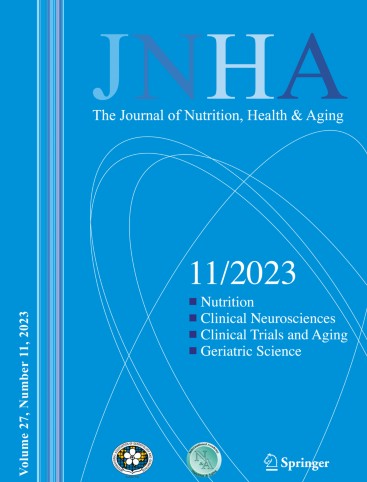Oxidative stress and inflammation mediate the association between Life's Crucial 9 and biological ageing: A secondary analysis of two observational studies
IF 4
3区 医学
Q1 GERIATRICS & GERONTOLOGY
引用次数: 0
Abstract
Background
Life’s Essential 8 (LE8) is known to have a negative correlation with biological aging, while the relationship between the Life’s Crucial 9 (LC9) score, which includes mental health, and biological aging remains to be further investigated.
Methods
We obtained data from two national cohorts, the UK Biobank and National Health and Nutrition Examination Survey (NHANES), to analyze the association between LC9 and biological aging. Biological aging was assessed using PhenoAge and KDMAge, with gender, race, and other indicators included as covariates. We applied linear regression models and restricted cubic splines (RCS) to analyze and describe the relationship. Furthermore, we explored the mediating role of oxidative stress and inflammation in the association between LC9 and biological aging. Subgroup analyses were conducted using multiple linear regression models, and differences between subgroups were assessed through interaction p-value tests. Sensitivity analyses were subsequently performed, followed by an exploration of the underlying mechanisms.
Results
In this study, the UK Biobank cohort included 46,599 participants, with 44,973 participants having complete data for all covariates, LC9, and the necessary calculations for PhenoAge and KDMage. In the NHANES cohort, these numbers were 11,726 and 5,936, respectively. In the UK Biobank cohort, a significant association was found between the LC9 score and PhenoAge (β = −2.484, p < 0.001), with similar results observed for KDMage (β = −7.987, p < 0.001). Similar findings were observed in the NHANES cohort, with significant associations between the LC9 score and both PhenoAge (β = −5.327, p < 0.001) and KDMAge (β = 11.826, p < 0.001). These findings align with previous research suggesting that higher LC9 scores are associated with slower biological aging. After multivariable adjustment, an "inverse L-shaped" relationship was observed (non-linear P < 0.001). In the mediation analysis, oxidative stress and inflammation showed significant mediating effects between LC9 and both PhenoAge and KDMage (p < 0.001 for both). In the subgroup analysis, the LC9 score showed broad applicability, particularly among male participants aged over 60 years.
Conclusion
This cohort study suggests that higher LC9 scores are associated with slower biological aging. In addition to emphasizing diet and lifestyle habits, the role of mental health in biological aging should not be overlooked.
氧化应激和炎症介导了生命关键与生物衰老之间的联系:对两项观察性研究的二次分析
已知生命基本8分(LE8)与生物衰老呈负相关,而包括心理健康在内的生命关键9分(LC9)与生物衰老之间的关系仍有待进一步研究。方法我们从英国生物银行和国家健康与营养检查调查(NHANES)两个国家队列中获取数据,分析LC9与生物衰老之间的关系。生物老化的评估采用表型age和KDMAge,包括性别、种族和其他指标作为协变量。我们应用线性回归模型和限制三次样条(RCS)来分析和描述这种关系。此外,我们还探讨了氧化应激和炎症在LC9与生物衰老之间的中介作用。采用多元线性回归模型进行亚组分析,通过交互p值检验评估亚组间差异。随后进行敏感性分析,然后探索潜在的机制。在这项研究中,UK Biobank队列包括46,599名参与者,其中44,973名参与者具有所有共变量、LC9和必要的表型age和KDMage计算的完整数据。在NHANES队列中,这两个数字分别为11726和5936。在UK Biobank队列中,LC9评分和PhenoAge之间存在显著关联(β = - 2.484, p < 0.001), KDMage也有类似的结果(β = - 7.987, p < 0.001)。在NHANES队列中也观察到类似的结果,LC9评分与表型年龄(β = - 5.327, p < 0.001)和KDMAge (β = 11.826, p < 0.001)之间存在显著关联。这些发现与先前的研究一致,即LC9得分越高,生物衰老速度越慢。多变量调整后,观察到“逆l形”关系(非线性P <; 0.001)。在中介分析中,氧化应激和炎症在LC9对表型age和KDMage均有显著的中介作用(两者的p <; 0.001)。在亚组分析中,LC9评分显示出广泛的适用性,特别是在60岁以上的男性参与者中。结论本队列研究提示LC9得分越高,生物衰老越慢。除了强调饮食和生活习惯外,心理健康在生物衰老中的作用也不容忽视。
本文章由计算机程序翻译,如有差异,请以英文原文为准。
求助全文
约1分钟内获得全文
求助全文
来源期刊
CiteScore
7.80
自引率
3.40%
发文量
136
审稿时长
4-8 weeks
期刊介绍:
There is increasing scientific and clinical interest in the interactions of nutrition and health as part of the aging process. This interest is due to the important role that nutrition plays throughout the life span. This role affects the growth and development of the body during childhood, affects the risk of acute and chronic diseases, the maintenance of physiological processes and the biological process of aging. A major aim of "The Journal of Nutrition, Health & Aging" is to contribute to the improvement of knowledge regarding the relationships between nutrition and the aging process from birth to old age.

 求助内容:
求助内容: 应助结果提醒方式:
应助结果提醒方式:


